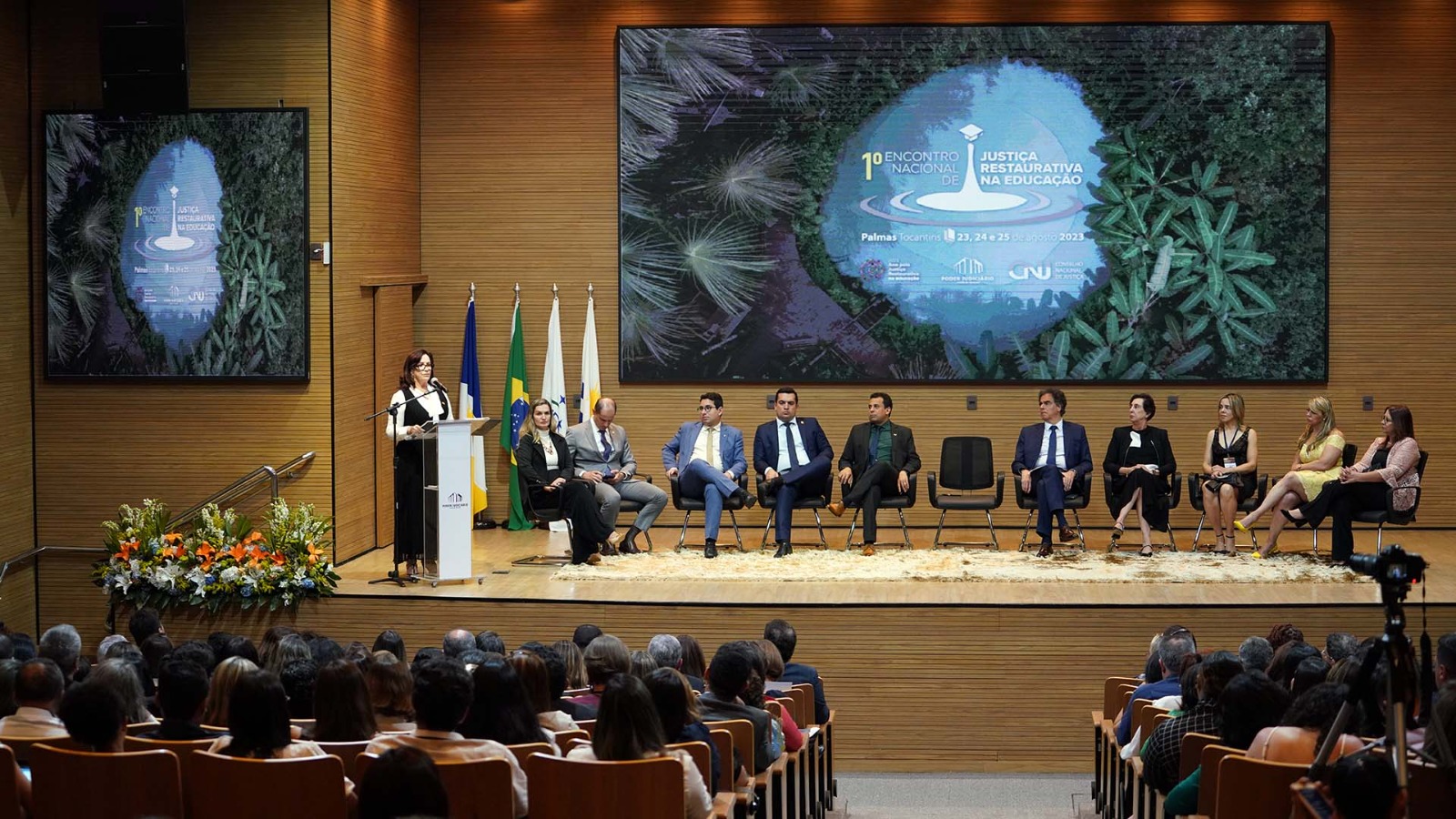
Officially opened on Wednesday afternoon (August 23rd), the 1st National Meeting of Restorative Justice in Education is discussing best practices and strategies for developing the restorative justice in schools, with an innovative approach. The opening ceremony was attended by various authorities, magistrates and educators and it was held in the auditorium of the Court of Justice of the State of Tocantins (TJTO), where the program continues until Friday (August 25th).
Opening the event, the President of the TJTO, Justice Etelvina Maria Sampaio Felipe, exalted the numerous benefits of applying the restorative justice in schools, such as creating a space for shared listening, dialog and learning. "This is an investment in the formation of conscious and ethical citizens, in building a culture of respect, empathy and collaboration," she said.
According to the President, in the State of Tocantins, justice and education "already go hand in hand" and she mentioned the Judicial Centers for Conflict Resolution and Citizenship (Cejuscs), which are present in all the the courts of the State, and which develop projects in various schools to foster social pacification.
At the time, she mentioned some of the projects developed, such as "Dialogue and Peace at School", in the District of Palmas; "Restorative Justice in the School Environment - School Pacification", in the District of Araguaína; the "Restorative Justice in Schools" project, in the District of Pedro Afonso; and EducaJus - Chatting with Justice, idealized and coordinated by the Assistant Judge of the Presidency, Rosa Maria Gazire.
Transformation
Coordinator of the Management Committee of Restorative Justice and Advisor to the National Council of Justice (CNJ), Minister Luiz Philippe Vieira de Mello Filho, emphasized that the purpose of the project is to enable members of the school community to understand a profound and transformative conception of the Restorative Justice, as well as to help each member of the school community to revisit their beliefs and theories about conflict and violence.
According to the Minister, the idea is for these actors to be able to transform the school coexistence in line with the values, principles and guidelines of the restorative justice, as well as to present different ways of transforming conflicts, based on dialogue, building individual and collective responsibility, meeting needs, repairing damage and harmonizing relationships on the basis of fundamental human rights. "We are thinking of mechanisms that allow those who are excluded to build a political space for their identity, their emotions and their affections, to share the leading role in the realization of justice with society," he said.
"We're looking for more than a welcoming coexistence, we're looking to enable each and every one of them to really feel that they belong and, at the same time, that they are very important beings, just the way they are," said Vieira de Mello Filho, stressing that a culture of peace, dialogue, understanding, solidarity, respect and dignity can restore a society marked by inequality, poverty and hunger.
The excluded need a judiciary with a different look, concluded the Minister, inviting everyone to be protagonists of this change.
Medium and long-term policy
The General Coordinator of Educational Policies for Youth at the Ministry of Education (MEC), Yann Evanovick Leitão Furtado, said that the meeting is the kind of event that marks out the society that is to be built. "We are very excited not only about this event, but about all the work that the restorative justice is already doing," he said.
"We know that this is not an action that will give us an immediate response, this is a medium and long-term policy," he emphasized, stressing that this kind of policy needs to be made.
The look of Justice
For the Secretary of State for Education, Fábio Pereira Vaz, this look by the courts at a policy of integration and restoration is very important. "It's a unique opportunity that the Court of Justice is providing for the State of Tocantins to host the event," he said, recognizing the opportune moment for the teams from Seduc and the regional directorates. "Our civil servers are also here taking part in this very important moment."
The transformative power of water
The transformative power of water is the theme of the 1st National Meeting on Restorative Justice in Education, promoted by the CNJ and the Judiciary of the State of Tocantins.
The event was also attended by the Assistant Judge to the President of the National Council of Justice, Amini Haddad; the Deputy Director of the Superior School of the Judges of the State of Tocantins (Esmat), Justice Angela Haonat, representing the General Director, Justice Marco Villas Boas; Justice Euripedes Lamounier, the 2nd Vice-president of the Legislative Assembly of the State of Tocantins, Deputy Gutierres Torquato; the Prosecutor Abel Andrade Leal Júnior, representing the General Attorney, Luciano Cesar Casaroti; the Public Defender of the State, Estellamaris Postal; the Vice-president of the Bar Association of the State of Tocantins (OAB/TO), Priscila Madruga; and the President of the Association of the Magistrates of the State of Tocantins (Asmeto), Judge Odete Almeida; and magistrates from the State of Tocantins.




